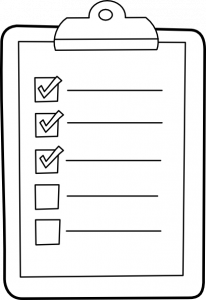1

Learning Objectives
In today’s class we will cover:
- Introduction to the Course
- Introduction to Using the Communications Technology Software
- Review of Course Outline, Deliverables, and Grading Rubrics
- Instructor Teaching Philosophy

EVALUATION
The grade for this course is composed of the mark received for each of the following components:
|
Percent/Weight |
| Complete all modules within “Building an Entrepreneurial Mindset” | Required |
| Class Participation Based on Experiential Learning (TEDPoints) | 20% |
| Class Participation Based on In-Class Experiences | 10% |
| Assurances of Learning (AoL) Documents (4% for each acceptable document up to 12 maximum) | 48% |
| Final Report | 30% |
| TOTAL (up to 8% bonus points available) | 108% |
Completion of all Modules within “Building an Entrepreneurial Mindset”
The course textbook “Building an Entrepreneurial Mindset” with integrated video, audio and quizzes must be completed in a timely manner in order to pass this course. This Open Educational Resource (OER) published as an interactive .H5P file is available through D2L. Students may only progress through this learning sequence by engaging with and correctly answering all quiz questions. This is a mandatory pass/fail course requirement and is not graded. Your Percent Completion Score is shown on D2L and must show as 100% no later than the last day of the course.
Class Participation Based on Experiential Learning Activities – 20% of Grade
Your Experiential Learning grade will be based on the accumulation of TedPoints (TP) up to a maximum of 20% according to the following point system:
|
Grade Points in ENT 101 |
% out of 20 points |
| 3 | 5 | 25% |
| 7 | 10 | 50% |
| 15 | 15 | 75% |
| 21 | 18 | 90% |
| 27 or more | 20 | 100% |
TEDPoints incentivise students for building their human and social capital through extra-curricular activities. TEDPoints are tracked by TRSM staff using Salesforce and are acquired through activities such as attending Business Career Hub (BCH) events, joining student clubs and engaging in other appropriate activities. An hour of activity outside class is generally worth approximately 1 TEDPoint.
Experiential activities outside TRSM that are not already tracked by TEDPoints may potentially be added to your score by making a request when you submit your AoL Document for that activity. Work-related experiential activities may also potentially be counted toward this score by making a request when you submit AoL Document for that activity.
Class Participation Based on In-Class Activities – 10% of Grade
Student participation in the weekly synchronous in-class activities will be tracked in both the two-hour large-format and one-hour lab sessions using appropriate methods as explained in class.
AoL Documentation Assignments – 48% of Grade
The objective of this course is to encourage you to go out and do interesting things and gain hands-on experience – that’s why it’s called experiential learning. Unlike reciting known answers through traditional examinations, you document what you learned during these activities through evidence-based Assurances of Learning (AoL). These AoL assignments, worth 4% each will help you document that you achieved course learning outcomes like having an entrepreneurial mindset, empathy, curiosity, self-direction and self-discipline.
This course has a mandatory minimum communication learning outcome requirement.
Each assignment should use the course communication technology software and must therefore be entirely free of any spelling, punctuation or grammar mistakes. Each acceptable assignment (meeting the standards normally associated with a B- or greater) will receive 4 points toward your final grade. Assignments that do not meet this university-level B- standard for written communication will receive a zero on the assignment and the student is invited to revise and resubmit the assignment up to 2 additional times with no penalty. Appropriate communications support services are available through TRSM to provide upskilling to students to help them pass this minimum communication standard for the university.
An acceptable AoL Assignment, worth 4% of the final grade, is generally considered to be 2-3 pages long, 500-800 words, poster, infographic, 2-3 minute video or live presentation. Each student must complete a minimum of 5 acceptable passing assignments and may complete up to a maximum of 12 acceptable passing assignments (i.e., the student may earn up to 48 points).
The course’s interactive Open Educational Resource (OER) “Building an Entrepreneurial Mindset” provides a workbook with assignment suggestions and examples to help the student document what they learned while earning TEDPoints. Each week will introduce the student to a number of potential assignments to complete and hand in for grading during the one-hour communication lab sessions. AoL Assignments described in the OER may include:
- Self-Analysis and the Bird-in-the-Hand Principle
- Goal-Setting and Time Management
- Interviewing to Practice User-Empathy and Active Listening
- Networking
- Curiosity, Proactivity, Alertness and Opportunity Spotting
- Growth Mindset, Resiliency, Re-Framing and Anti-Fragility
- Radical Candor, Teamwork and Crazy Quilt Principle
- Zone Learning
- Intrapreneurship and Innovation on the Job
- Social Changemaking
- Personal Empowerment
- Student Club Engagement
- Business Model Canvas, Business Model You
- Career Design
- Self-Reflection
- Public Speaking
- Video Pitch Presentation
Students will practice giving live in-class presentations and giving and receiving feedback during the one-hour in-class communication workshops. In addition, students will be given the option to make a short video presentation with their personal pitch that will be peer reviewed as well as graded by the instructor.
Final Report – 30% of Grade
Students will prepare a professionally-formatted final report that will include all accepted (B- or better grade) written communication assignments along with a summary of their self-analysis and plans to grow their human capital, social capital and character during their university learning journey, in line with their overall career goals and following the Bird-In-Hand Principle.
There is no midterm exam and no final exam.
TEACHING METHODS
This course has a synchronous 2-hour large format in-class session and a 1-hour communications lab per week. The 2-hour lecture will be large format (350-600 students in 1-067) supplemented by 1 hour per week of asynchronous content and primarily taught by the Lead Instructor.
The asynchronous content “Building an Entrepreneurial Mindset” will include video material and interactive written material with embedded learning objects and mandatory quizzes to ensure engagement and comprehension. Students may only progress through this learning sequence by engaging with and correctly answering passing quizzes throughout. This Open Educational Resource (OER) published as an interactive .H5P file is available through, and completion tracked by, D2L.
The synchronous 1-hour communications lab sections are held for a single TEDPack group of 45 students, each taught by a CUPE instructor who is responsible for all grading and potentially hiring and managing their own Teaching Assistants. Each session is focused on the collaborative development of communication skills in the entrepreneurial context and helps students learn to provide acceptable AoL Documentation to be included in their Final Report.
COURSE MATERIALS
Course readings with embedded learning engagement technology and interactive quizzes, interactive learning videos and other materials will be developed by the Lead Instructor and will be available free of charge to students. Other readings, content and videos produced for the course and/or assigned by the course will be available either online or through the university library.
Students are required to purchase software to assist with grammar and writing style such as ProWritingAid or Grammarly (to be determined in collaboration with UCC Sub-Committee on Communications).

 Method
Method